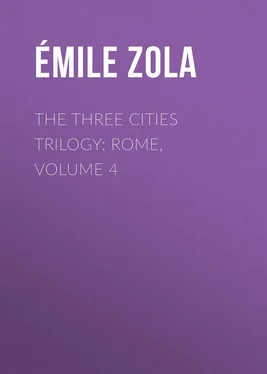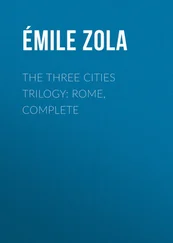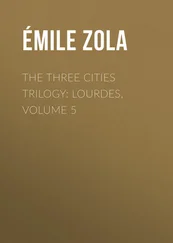Émile Zola - The Three Cities Trilogy - Rome, Volume 4
Здесь есть возможность читать онлайн «Émile Zola - The Three Cities Trilogy - Rome, Volume 4» — ознакомительный отрывок электронной книги совершенно бесплатно, а после прочтения отрывка купить полную версию. В некоторых случаях можно слушать аудио, скачать через торрент в формате fb2 и присутствует краткое содержание. Жанр: literature_19, foreign_antique, foreign_prose, на английском языке. Описание произведения, (предисловие) а так же отзывы посетителей доступны на портале библиотеки ЛибКат.
- Название:The Three Cities Trilogy: Rome, Volume 4
- Автор:
- Жанр:
- Год:неизвестен
- ISBN:нет данных
- Рейтинг книги:3 / 5. Голосов: 1
-
Избранное:Добавить в избранное
- Отзывы:
-
Ваша оценка:
- 60
- 1
- 2
- 3
- 4
- 5
The Three Cities Trilogy: Rome, Volume 4: краткое содержание, описание и аннотация
Предлагаем к чтению аннотацию, описание, краткое содержание или предисловие (зависит от того, что написал сам автор книги «The Three Cities Trilogy: Rome, Volume 4»). Если вы не нашли необходимую информацию о книге — напишите в комментариях, мы постараемся отыскать её.
The Three Cities Trilogy: Rome, Volume 4 — читать онлайн ознакомительный отрывок
Ниже представлен текст книги, разбитый по страницам. Система сохранения места последней прочитанной страницы, позволяет с удобством читать онлайн бесплатно книгу «The Three Cities Trilogy: Rome, Volume 4», без необходимости каждый раз заново искать на чём Вы остановились. Поставьте закладку, и сможете в любой момент перейти на страницу, на которой закончили чтение.
Интервал:
Закладка:
"Well, what of the temporal power?" asked Pierre.
The prelate had again become silent, raising his amiable face to heaven and waving his white hands with a pretty gesture. And when he once more opened his mouth it was to say: "Then there's your new religion – for the expression occurs twice: the new religion, the new religion – ah, /Dio/!"
Again he became restless, going off into an ecstasy of wonderment, at sight of which Pierre impatiently exclaimed: "I do not know what your report will be, Monseigneur, but I declare to you that I have had no desire to attack dogma. And, candidly now, my whole book shows that I only sought to write a work of pity and salvation. It is only justice that some account should be taken of one's intentions."
Monsignor Fornaro had become very calm and paternal again. "Oh! intentions! intentions!" he said as he rose to dismiss his visitor. "You may be sure, my dear Monsieur Froment, that I feel much honoured by your visit. Naturally I cannot tell you what my report will be; as it is, we have talked too much about it, and, in fact, I ought to have refused to listen to your defence. At the same time, you will always find me ready to be of service to you in anything that does not go against my duty. But I greatly fear that your book will be condemned." And then, as Pierre again started, he added: "Well, yes. It is facts that are judged, you know, not intentions. So all defence is useless; the book is there, and we take it such as it is. However much you may try to explain it, you cannot alter it. And this is why the Congregation never calls the accused parties before it, and never accepts from them aught but retraction pure and simple. And, indeed, the wisest course would be for you to withdraw your book and make your submission. No? You won't? Ah! how young you are, my friend!"
He laughed yet more loudly at the gesture of revolt, of indomitable pride which had just escaped his young friend, as he called him. Then, on reaching the door, he again threw off some of his reserve, and said in a low voice, "Come, my dear Abbe, there is something I will do for you. I will give you some good advice. At bottom, I myself am nothing. I deliver my report, and it is printed, and the members of the Congregation read it, but are quite free to pay no attention to it. However, the Secretary of the Congregation, Father Dangelis, can accomplish everything, even impossibilities. Go to see him; you will find him at the Dominican convent behind the Piazza di Spagna. Don't name me. And for the present good-bye, my dear fellow, good-bye."
Pierre once more found himself on the Piazza Navona, quite dazed, no longer knowing what to believe or hope. A cowardly idea was coming over him; why should he continue this struggle, in which his adversaries remained unknown and indiscernible? Why carry obstinacy any further, why linger any longer in that impassionating but deceptive Rome? He would flee that very evening, return to Paris, disappear there, and forget his bitter disillusion in the practice of humble charity. He was traversing one of those hours of weakness when the long-dreamt-of task suddenly seems to be an impossibility. However, amidst his great confusion he was nevertheless walking on, going towards his destination. And when he found himself in the Corso, then in the Via dei Condotti, and finally in the Piazza di Spagna, he resolved that he would at any rate see Father Dangelis. The Dominican convent is there, just below the Trinity de' Monti.
Ah! those Dominicans! Pierre had never thought of them without a feeling of respect with which mingled a little fear. What vigorous pillars of the principle of authority and theocracy they had for centuries proved themselves to be! To them the Church had been indebted for its greatest measure of authority; they were the glorious soldiers of its triumph. Whilst St. Francis won the souls of the humble over to Rome, St. Dominic, on Rome's behalf, subjected all the superior souls – those of the intelligent and powerful. And this he did with passion, amidst a blaze of faith and determination, making use of all possible means, preachings, writings, and police and judicial pressure. Though he did not found the Inquisition, its principles were his, and it was with fire and sword that his fraternal, loving heart waged war on schism. Living like his monks, in poverty, chastity, and obedience – the great virtues of those times of pride and licentiousness – he went from city to city, exhorting the impious, striving to bring them back to the Church and arraigning them before the ecclesiastical courts when his preachings did not suffice. He also laid siege to science, sought to make it his own, dreamt of defending God with the weapons of reason and human knowledge like a true forerunner of the angelic St. Thomas, that light of the middle ages, who joined the Dominican order and set everything in his "Summa Theologiae," psychology, logic, policy, and morals. And thus it was that the Dominicans filled the world, upholding the doctrines of Rome in the most famous pulpits of every nation, and contending almost everywhere against the free sprit of the Universities, like the vigilant guardians of dogma that they were, the unwearying artisans of the fortunes of the popes, the most powerful amongst all the artistic, scientific, and literary workers who raised the huge edifice of Catholicism such as it exists to-day.
However, Pierre, who could feel that this edifice was even now tottering, though it had been built, people fancied, so substantially as to last through all eternity, asked himself what could be the present use of the Dominicans, those toilers of another age, whose police system and whose tribunals had perished beneath universal execration, whose voices were no longer listened to, whose books were but seldom read, and whose /role/ as /savants/ and civilisers had come to an end in presence of latter-day science, the truths of which were rending dogma on all sides. Certainly the Dominicans still form an influential and prosperous order; but how far one is from the times when their general reigned in Rome, Master of the Holy Palace, with convents and schools, and subjects throughout Europe! Of all their vast inheritance, so far as the Roman curia is concerned, only a few posts now remain to them, and among others the Secretaryship of the Congregation of the Index, a former dependency of the Holy Office where they once despotically ruled.
Pierre was immediately ushered into the presence of Father Dangelis. The convent parlour was vast, bare, and white, flooded with bright sunshine. The only furniture was a table and some stools; and a large brass crucifix hung from the wall. Near the table stood the Father, a very thin man of about fifty, severely draped in his ample white habit and black mantle. From his long ascetic face, with thin lips, thin nose, and pointed, obstinate chin, his grey eyes shone out with a fixity that embarrassed one. And, moreover, he showed himself very plain and simple of speech, and frigidly polite in manner.
"Monsieur l'Abbe Froment – the author of 'New Rome,' I suppose?" Then seating himself on one stool and pointing to another, he added: "Pray acquaint me with the object of your visit, Monsieur l'Abbe."
Thereupon Pierre had to begin his explanation, his defence, all over again; and the task soon became the more painful as his words fell from his lips amidst death-like silence and frigidity. Father Dangelis did not stir; with his hands crossed upon his knees he kept his sharp, penetrating eyes fixed upon those of the priest. And when the latter had at last ceased speaking, he slowly said: "I did not like to interrupt you, Monsieur l'Abbe, but it was not for me to hear all this. Process against your book has begun, and no power in the world can stay or impede its course. I do not therefore realise what it is that you apparently expect of me."
Читать дальшеИнтервал:
Закладка:
Похожие книги на «The Three Cities Trilogy: Rome, Volume 4»
Представляем Вашему вниманию похожие книги на «The Three Cities Trilogy: Rome, Volume 4» списком для выбора. Мы отобрали схожую по названию и смыслу литературу в надежде предоставить читателям больше вариантов отыскать новые, интересные, ещё непрочитанные произведения.
Обсуждение, отзывы о книге «The Three Cities Trilogy: Rome, Volume 4» и просто собственные мнения читателей. Оставьте ваши комментарии, напишите, что Вы думаете о произведении, его смысле или главных героях. Укажите что конкретно понравилось, а что нет, и почему Вы так считаете.












